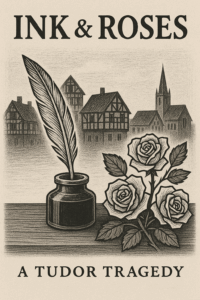(Stratford-upon-Avon, 25 April 1592)
The river runs high after the rains, and the whole house trembles with the mill-wheel’s turning. I feel the shake in my bones the way other women feel church bells. It is the season when everything grows—even the spaces between us.

I sit at the little oak table that once belonged to my father, light thin as whey through the leaded glass, and count coins into piles: one for the baker, one for the butcher, one for the schoolmaster who says Hamnet is quick but too fond of birds’ nests. The fourth pile—six pennies and a clipped angel—bears no mark. I turn the angel over twice, then slip it into the purse beneath the loose board. It is the first coin to cross the threshold without another mouth already calling for it.
Upstairs Susanna recites her letters to the twins, who answer in giggles and thuds. Their voices chase each other like swallows under the eaves. I think: Will would smile at that. Then I think: he is not here to smile.
I was twenty-six when he was sixteen, and I liked the way he read verses to the river reeds as though they were an audience. I liked the way he looked startled when I laughed—startled, then determined, as if laughter were a riddle he could solve by kissing it. When the harvest failed and my father’s roof leaked, Will’s voice was the only warm thing in the county. I let him stay late; I let him stay later. When the consequence announced itself in the skipping of a month’s courses, he married me with a ring of barley straw he twisted while I wept. He wore it until the priest spoke, then tucked it into the prayer book he still carries. I have never asked if it is still there.
Some nights I count the years between us the way others count rosary beads—ten beads, ten years—and wonder whether love is a thread strong enough to stretch so far. Other nights I listen to the mill wheel and think: perhaps love is simply the sound of one person working while another is away.
He sends money when he can. He writes the children a nonsense rhyme for every shilling. He writes me one line only—“I keep the barley straw.” I do not know if that is love, but it is something I can hold in my palm like a warm egg. I do not know if it will hatch or spoil. I only know I am tired of wondering.
Tonight I will seal this letter with plain wax and no perfume. I will tell him the twins have grown two fingers taller, that the cherry tree blossomed early, that the miller’s dog still barks at the moon on his behalf. I will not ask when he is coming home. I will not ask if there is another woman, or another man, or simply another stage that keeps him later than I ever did. I will only ask that he remember the river is still running high, and that the wheel turns whether he listens or not.
—Anne Hathaway
—–
Next Time: Kit owes three pounds by Pentecost, and the dice are turning ugly.
Comment below with the one word you’d send to Anne, or share with a friend who’d guard a secret on barley straw.
